Corax- Lord of Shadows Read online
Page 2
Terr eventually got the message that Aranan wasn’t going to sign away the family fortune, and left with demands for dinner and business talk at a later date. Aranan made some vague noises about asking his under-secretary to contact Terr’s under-secretary while vowing never to go near the man if he could help it.
When Terr had gone, Aranan hid behind the buffet.
After another excruciating hour the first of the guests began to leave. Departure and arrival at this sort of thing were done in strict order of hierarchy. Now he could leave without causing a scene. Sighing with gratitude, Aranan made his excuses and summoned his grav-car to the front of the building.
Slavery was one of the first Kiavahran institutions to go. He’d had the education in the scholams that said it had to be so. He’d also had a different education at home that said the so-called Saviour forced the guilds to capitulate by murdering four hundred thousand people with atomic charges.
Grand sentiments laced the new constitution. Under the surface, nothing much had changed. Uniformed flunkeys hovered within beckoning distance to indulge the guild masters’ every whim. As Aranan skulked out of the building men and women appeared from hidden rooms to dust off his jacket and drape alien furs about his shoulders. A concierge imperiously held back the line of less-rich citizens waiting to leave until Aranan had gone. Other servants smoothly took the place of the cloakroom attendants to lead him to his jet-black limousine. The car was staggeringly expensive, powered by the same engines that lifted the whispercutters. Any impeller array that could carry ten fully armoured Legiones Astartes in a reasonable approximation of flight had no trouble lifting a groundcar a metre off the ground, even one so large and richly appointed as Aranan’s.
Aranan threw himself gracelessly into the back and flicked a coin at the valet. The man attempted to say something. Aranan pointedly wound up the window to cut his words dead.
Sealed in a private world of luxury, he felt somewhat better.
‘Did you have a pleasant evening, sir?’ His driver’s voice was a little off. Aranan put it down to a cold.
‘No, Raspuc Keev, I did not,’ he said to the tinted glassite screening off the driver’s compartment. The man’s mitre cap was visible as a smoky shape on the far side. Hands moved on the steering wheel. Aranan knew little of his chauffeur beyond this shadow play, and yet he often confided in him. The screen offered a form of anonymity, like the confessional in a cathedrum. ‘When I was younger I used to have so much fun. Not any more,’ Aranan said. ‘No fun for me.’ He tapped the window to emphasise his words.
Fun was before his father had died, leaving him at the tender age of twenty-nine to the mercy of post-compliance politics.
‘I remember when a party was a party,’ Aranan said. ‘A time to drink, and dance, and chase the daughters of the other tech-houses. Now what do I get? Endless supplication to the Mechanicum. That’s what all these receptions and pre-theatre events with their mean glasses of warm wine and tiny little canapés are,’ he growled to himself. ‘I don’t remember the last time I had a meal I had to cut up! I don’t even dare pick up the girls. They’re all spies.’
He threw his hand across the seat backrest and slumped. The vehicle had the capacity to carry eight people in extreme comfort. These days it was always just Aranan. With angry eyes he watched the yellow sodium glare of streetlights slide over the metal of his car, smooth as machine oil. Away from the cultural district the ugly, utilitarian style of Kiavahr asserted itself, depressing him further. ‘I wasn’t made for this. I wasn’t made for business. Let the damn Mechanicum have it all, I say.’
‘If you say so, sir,’ said Keev.
Aranan grunted. He leaned forward and plucked a bottle of Life Water from an inbuilt cooler. It was always a new, sealed bottle, no matter how little of it he had drunk the last time, and he always drank at least some. The measure left in the bottles diminished with each reception he attended. If he kept on, soon he would need two. The clink of ice into the glass raised his mood. The cool burn of alcohol in his throat raised it further.
He said no more to his driver, content to drink and watch the dreary cityscapes of Kiavahr go by. There were perks to being a guilder. His car thrummed down the smooth surfaces of priority traffic lanes past lines of boxy serf cars conveying the workforce to and from their manufactoria. Giant haulers chugged down the wide cargo way dividing public and private lanes, their enormous wheels supporting building-sized trailers. Atop the massive tractor units to the front were tiny pilot blisters housing servitors. The power of their engines set up a brief musical thrumming in the windows of Aranan’s limo as he sped past each one.
He let his gaze follow the logos on a trailer. Under hazy lighting the red brand mark was a smear, its paint faded away. It didn’t matter any longer who made what on Kiavahr. It all belonged to the Mechanicum.
The car peeled off the main expressway into a district of identical storage houses. Criss-crossing, multi-level pathways crawled with lines of servitor machines fetching and carrying boxes.
They were going the wrong way. Aranan sat forward, slopping out a splash of his drink.
‘What are you doing, Keev?’ he said. ‘Where are we going?’
‘There’s an overturned hauler further down the Rennta City highway. This avoids the site of the accident.’
Aranan nodded. Plausible, but he was unconvinced, and his concern grew to fear as the limousine turned into a side street and coasted to a slow stop.
The shadow of Raspuc Keev opened the driver’s door.
Guilders were no longer permitted to carry arms themselves, but they all did. Aranan pressed a microstud on his jacket button. A hidden drawer popped out of the limousine fittings.
Aranan blinked at the empty space where his laspistol should have been.
Oil-tainted air hissed into the car interior. Raspuc Keev stood by the open passenger door. Only it was not Raspuc Keev.
Aranan squinted. The street was dark, the driver’s face masked by shadow. ‘Who by the void are you?’ he said. But he knew. He could tell what this imposter was about to do. More than the fact that he was there. More than the slender needle pistol in his gloved hand, it was his eyes, the only feature he could see, glinting in the dark. They were flat, hard, devoid of emotion.
You are going to kill me. Aranan meant to say the words, but they were trapped in his brain. They were too awful for his mouth to let out.
‘Listen to you whine, you parasite.’ The driver reached up to his neck, and deactivated a voice modulator. Keev’s voice was replaced by a woman’s. Aranan dumbly noted the detail.
‘You have never done a day’s work in your life,’ she said. ‘Every pleasure is yours, and yet still you complain. We should have wiped you out when we had the chance. It is time to finish the job.’
The smooth, silver barrel of the needler came up. The aperture at its front looked too small to be dangerous. It was Aranan’s final thought.
‘Corvus Corax bids you farewell,’ said the woman, and shot Aranan Armadon Adrin through the heart.
Phelinia Eftt stared hate at the corpse sprawled across the seat. A pinprick of blood welled from the tiny wound. That aside, Adrin could have been sleeping.
She cast off the stolen uniform, tossing it onto the body of the driver crammed into the passenger footwell in the front. Underneath she had a tight bodysuit that she covered over with a worker’s clothes.
‘Target eliminated,’ she said into a vox-dot at her wrist. Her words were scrambled and cyphered before being cast out to her masters.
She threw an incendiary device into the back of the car. The thumb-sized bomb bounced on the seat and lost itself under Adrin. Despite the grenade’s seeming inconsequentiality, the tiny amount of phosphex gel it contained was more than enough to reduce the vehicle to slag.
The car was already burning as she vanished into the night, dodging through the ar
my of servitors loading and unloading the storage towers. Alarms wailed down the metal canyons.
By then she was long gone.
Three
the raven and the patrician
Corax was shown into a modest suite of rooms by an efficient menial. They shared no conversation. The man wordlessly indicated Corax should sit upon one of two chaise longues in the main living space before leaving the primarch alone.
They were not a king’s rooms. In the few decades Corax had fought in the crusade, he had encountered potentates of every kind, alien and human. Differing wildly in every respect, a taste for luxury was one of the few commonalities between them and one that several of his brothers shared.
Roboute Guilliman was a lord in his own right. His realm of Ultramar was greater than most stellar empires, but his chambers did not match his station. Modestly appointed, they could have been those of any human dignitary or high-ranking Space Marine officer. Their size, however, announced who they had been made for. When Corax walked into rooms furnished solely for a primarch’s use, he experienced a curious shifting in reality. For a few rare moments he was no longer a giant, but a man. The effect of shifting worlds, he noted, was similar to that of disconnecting from the strategio-simulacra.
The suite’s central room was square, cloistered around the edges but open in the centre to a high ceiling decorated with a moving cloudscape in reference to the enclosed courtyards common on Guilliman’s home world. Living vegetation crowded the cloister roof, hanging swags of green leaves over the tiles and sweetening the air. More manicured shrubs stood in pots around the periphery of the floor. The unruly nature of living things had been pruned and plucked into obedience, so they appeared as upright as soldiers on parade. Behind them were orderly landscapes captured in murals. Specially regulated light mimicked the glow of Macragge’s sun. Double doors led through four walls of the room. All save the entrance Corax had come in by were open onto other spaces which were likewise decorated in pale creams, golds and blues.
Guilliman’s tastes reflected those of sober Macragge. To Corax’s sensibilities the murals and the pilasters framing them were garish. Anything beautiful had to be small enough to hide on Lycaeus. Corax saw art in small things. Self-expression was a private affair, and only reluctantly shared. The prisoners of Lycaeus had taken what little time they had to themselves chipping rock into beautiful, flowing forms. Guilliman’s alcoves and his straight-lined geometric decorations, all slaved to the tyranny of the golden mean, appeared simultaneously ostentatious and rigid.
Corax recognised that his perceptions were dictated by the austerity of prison life. Objectively, Guilliman could only be accused of vanity when it came to displaying how sensible he was. He put a lot of effort into that, sometimes comically so, Corax thought; he was so desperate to show off how unshowy he was. He suspected Guilliman hid a large ego and a terrible temper under his rational exterior, although on that score Corax had no right to judge him. He had both himself.
Still, there it was. Corax was engineered to hide, but he did not hide what he was. Not like his brother.
But when Guilliman arrived, he shamed Corax for his harsh judgment. There was only dignified solicitude in his bearing.
‘I am sorry to keep you waiting, my brother,’ Guilliman said. ‘There were more matters that needed to be dealt with than I expected.’ He smiled apologetically. ‘There is always another matter.’
‘You were not long, but I am glad you are here,’ said Corax. ‘I feel like an imposter in places like this. There was nothing fine where I was raised.’
‘That is understandable.’ Guilliman busied himself at a table, tidying up a stack of books that was threatening to topple. ‘You must think our culture vulgar.’
‘Not at all,’ said Corax.
Guilliman smiled at the polite lie.
‘Compared to some, yours are restrained,’ continued Corax.
‘Fulgrim’s tastes must be overwhelming for you.’
‘Boarding the Pride of the Emperor was like being punched repeatedly in the face by a perfumed fist. I was glad to be off it.’
Guilliman laughed. ‘I wouldn’t tell him that. He’s terribly proud of that ship.’
‘I had no intention of doing so,’ said Corax. Fulgrim was another demi-god with a god-sized temper.
The Lord of Ultramar straightened the books until they all aligned. They were differing sizes, and so neatness was confined to their outward-facing spines. Whichever of Guilliman’s personal chambers Corax had been in on the Macragge’s Honour, there was a stack of books somewhere, heaped up to tottering heights. The pages spilled untidy sheafs of notes, sticking out papery tongues at the chaos in the world. Layered between, harder strata in the towers of knowledge, were data-slates and other devices. Guilliman was by nature a fastidious man, with everything assigned a proper place, but this tendency to order fought against his thirst for knowledge. Guilliman’s quarters were littered with vessels for information, and he scattered them like the husks of nuts thrown aside by small animals as they frantically hunted for more sustenance.
Guilliman went to an alcove and took up a tray bearing a tall bronze ewer and drinking vessels. He set it upon a low table between the couches, and sat down. He did not recline.
Corax’s gaze moved from the books to the stern face of their owner. Guilliman looked only a little like him. About the angle of the cheeks was there enough of a family resemblance to proclaim their brotherhood, nothing more. Corax was pale and shadowed, Guilliman golden.
‘I saw an ocean for the first time only ten years ago,’ said Corax.
‘Oh?’ said Guilliman. He raised the ewer in Corax’s direction, tipping back the lid with a thumb catch. The Ravenlord’s sensitive olfactory sense registered the fermented juices of grapes wafting from its throat. Wrapped up in the smell were volumes of information: the alcohol content, the colour, the acidity and the other, less-tangible factors that contributed to them – how long ago the berry had diverged from its ancestor, the soil it had been cultivated in, fragments of gene-code from the people who had made it, the composition of the air it had breathed, the trace minerals in the water that it drank.
‘I will drink, thank you,’ Corax said. ‘There are no oceans on Deliverance,’ he went on, ‘and none on Kiavahr either. There were many things I had no experience of, and the abstract knowledge father engineered into me was no comparison to the thing itself. I lacked context. No wind, no sun, no rain. No weather in the prison but the same steady light and stale draught of recycled air. No food other than prison rations.’
‘A hard upbringing,’ said Guilliman. He looked guilty. His youth had been glorious by comparison. He was raised a king’s son.
‘I would say not,’ said Corax. ‘It was not easy, but several of our other brothers had it worse than I. I was deprived of sensation, and when I see new things, I cannot help myself but make comparisons. My mind has become an engine for analogy!’ He mocked himself. He had no idea why he was relating this to his brother. The words emerged. They seemed like someone else’s.
‘Then you have a poetic soul.’
‘I have no facility for the writer’s arts,’ said Corax. ‘The words will not come easily, but the images are there. Your books remind me of the waves,’ said Corax. ‘Your kingdom and the measured way you rule, it is the steadfast shore, it is your need for order. But the shore is pounded upon by the waves and so disordered. That is your need for knowledge. I look at all these stacks of books and see peaks of knowledge thundering into the sand. Order against disorder.’
‘Are you saying I am untidy, brother?’ said Guilliman wryly. He handed Corax a finely worked glass full of wine. Ten mortal measures it contained. In Corax’s grasp it did not seem excessive.
‘I think you could be. There is a tension in you,’ said Corax.
‘There is in us all,’ said Guilliman. ‘Father made us that way. T
here are tensions within us, and between us. The similarities between us throw the differences into starker contrast, and therefore create a further source of tension. Our competencies are duplicated, but are never in exactly the same combination.’
Corax thought of Sanguinius and Angron, Dorn and Guilliman, The Khan and the Wolf. Similar pairings, all different, and part of other opposed pairs as well. In his desire for knowledge Guilliman was similar to Magnus, or Perturabo, though their interests were divergent. He also had Horus’ flare for grand strategy. Besides Guilliman, Dorn shared tendencies with Perturabo, who shared others with The Gorgon. Sanguinius had Fulgrim’s artfulness. So it went on.
He thought of himself and Curze. His inevitable comparator. His back tensed. He compared himself with the so-called Night Haunter often, and did not like what he saw.
‘I spend my life and all my efforts in reducing systemic tension,’ said Guilliman. ‘One cannot rule a realm of Ultramar’s size any other way, but I have my eyes open enough to see that tension is a source of energy.’
‘Tension pushes the Great Crusade outward,’ agreed Corax. ‘If yours is the tension between voracious curiosity and stability, what generates mine?’
Corax sipped the wine while Guilliman took a moment to formulate his answer. More information flooded his mind from the wine. How it must be to be truly human, Corax wondered. A mortal – a term he learned from his brothers, arrogant almost, but he could think of no better – lacked the additional organs that allowed the culling of hidden truths from ingestion. The warriors of his Legion might experience the drinking of the wine a similar way to he, but their appreciation of it would be different: cruder, less refined. How alone he would feel, were it not for his brothers. He had been alone once. Corax was glad of Guilliman’s presence.

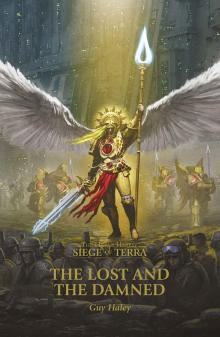 The Lost and the Damned (The Horus Heresy Siege of Terra Book 2)
The Lost and the Damned (The Horus Heresy Siege of Terra Book 2)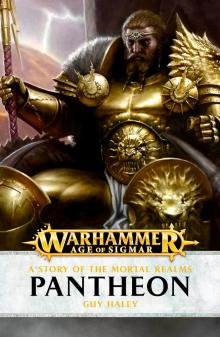 Pantheon
Pantheon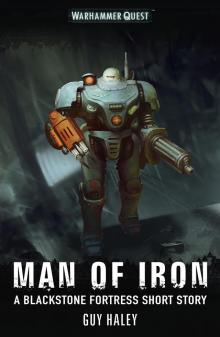 Man of Iron
Man of Iron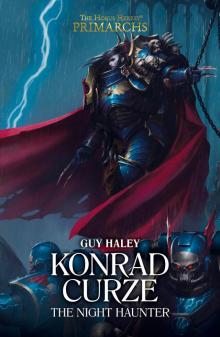 Konrad Curze the Night Haunter
Konrad Curze the Night Haunter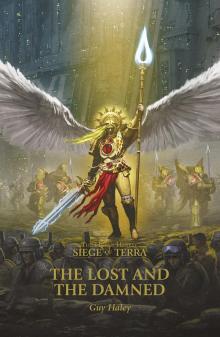 The Lost and the Damned
The Lost and the Damned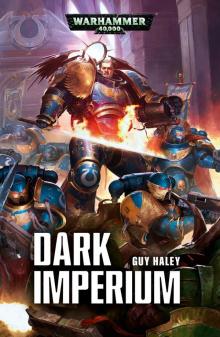 Dark Imperium
Dark Imperium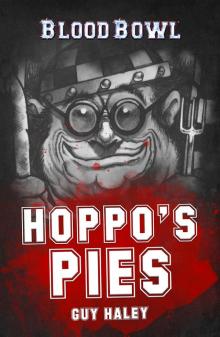 Hoppo's Pies
Hoppo's Pies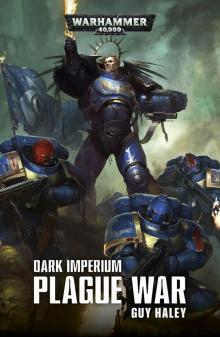 Dark Imperium: Plague War
Dark Imperium: Plague War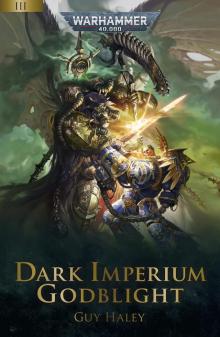 Dark Imperium: Godblight
Dark Imperium: Godblight Crash
Crash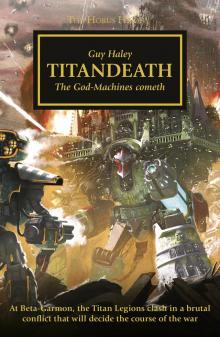 Titandeath
Titandeath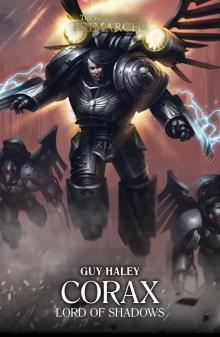 Corax- Lord of Shadows
Corax- Lord of Shadows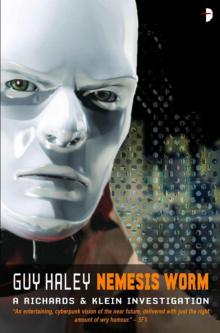 The Nemesis Worm
The Nemesis Worm Wolfsbane
Wolfsbane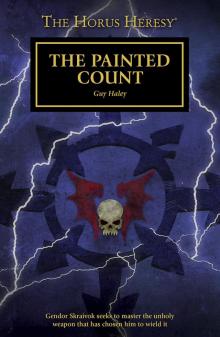 The Painted Count
The Painted Count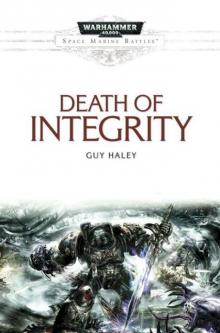 The Death of Integrity
The Death of Integrity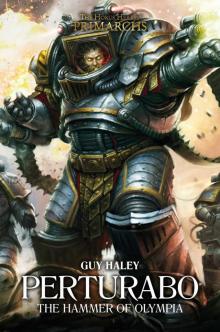 Perturabo: Hammer of Olympia
Perturabo: Hammer of Olympia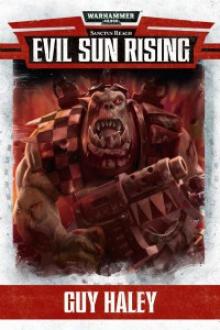 Evil Sun Rising
Evil Sun Rising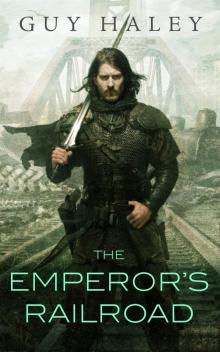 The Emperor's Railroad
The Emperor's Railroad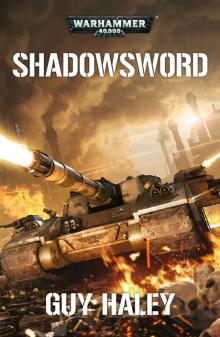 Shadowsword
Shadowsword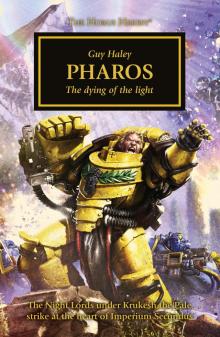 Pharos
Pharos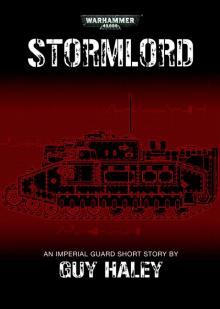 Stormlord
Stormlord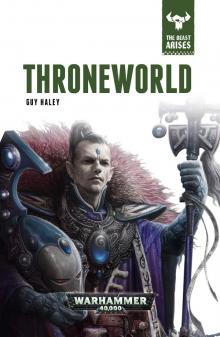 Throneworld
Throneworld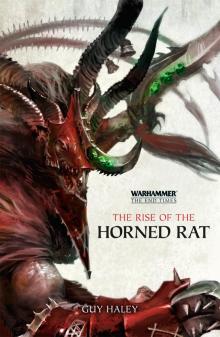 The End Times | The Rise of the Horned Rat
The End Times | The Rise of the Horned Rat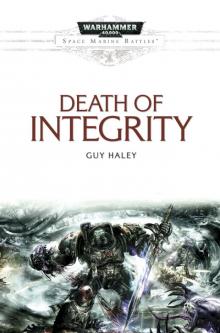 Death of Integrity
Death of Integrity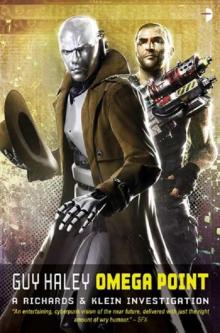 Omega Point
Omega Point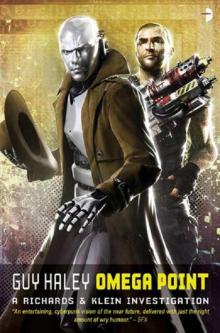 Omega point rak-2
Omega point rak-2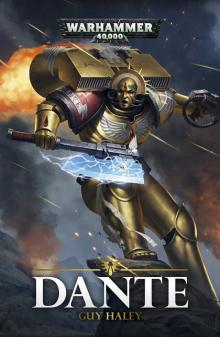 Dante
Dante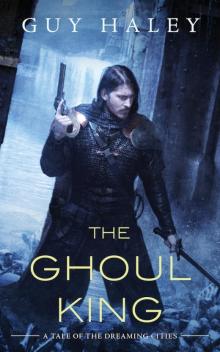 The Ghoul King
The Ghoul King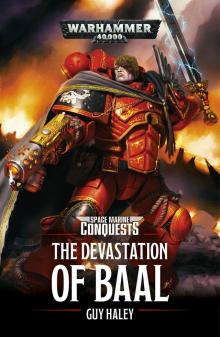 The Devastation of Baal
The Devastation of Baal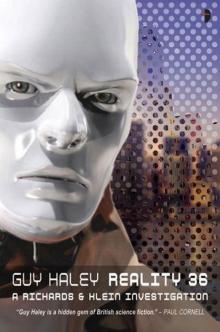 Reality 36: A Richards & Klein Novel
Reality 36: A Richards & Klein Novel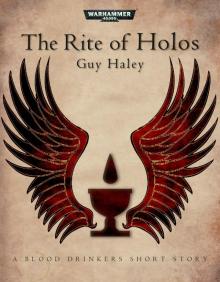 The Rite of Holos
The Rite of Holos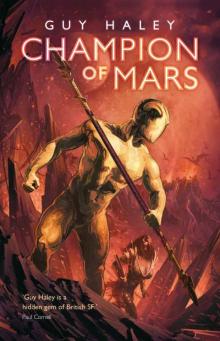 Champion of Mars
Champion of Mars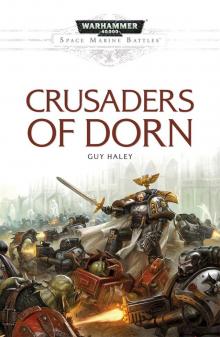 Crusaders of Dorn
Crusaders of Dorn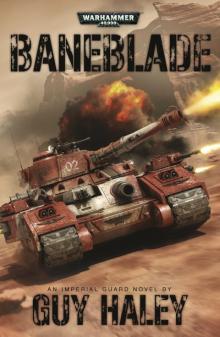 Baneblade
Baneblade